Award-Winning Chicago Personal Injury Lawyer - Securing Justice
for Illinois Injury Victims - Over $450 Million Recovered
Our Chicago Uber & Lyft accident lawyer team moves fast to protect your rights after a rideshare accident anywhere in the city, from the Loop and River North to Bronzeville, Wicker Park, and near O’Hare.
Whether you were a rideshare passenger, a pedestrian, or another motorist in a crash involving a rideshare vehicle, we take on rideshare companies and any insurance company involved so accident victims can focus on healing while we pursue compensation. Contact us for a free consultation!
At Rosenfeld Injury Lawyers, we’ve helped countless individuals and families secure justice and compensation for serious rideshare accidents throughout Chicago. Here are just a few examples.
$4,000,000 – Fatal Rideshare Crash in the West Loop
Our client’s sister, Olivia, was riding in the backseat of a rideshare vehicle near the West Loop when the driver ran a red light at the intersection of West Madison and Halsted. She was killed instantly in the crash. We were able to show that the rideshare company’s lax driver screening contributed to the fatal car accident, leading to a wrongful death settlement for her surviving family.
$3,500,000 – Passenger Shot by Rideshare Driver After Argument
While returning home from a night out in River North, a young woman named Brianna was shot and killed during an altercation with her rideshare driver. The company argued the driver was an independent contractor, but we pushed back hard, demonstrating a pattern of violent behavior that should have raised red flags.
$2,855,000 – Pedestrian Hit by Rideshare Driver on Michigan Avenue
Paul, a 33-year-old marketing executive, was struck while crossing Michigan Avenue near Millennium Park. The rideshare vehicle failed to yield in a marked crosswalk, causing a compound leg fracture that required two surgeries. Despite the rideshare company’s attempt to shift blame, we recovered compensation for Paul’s extensive medical bills and lost income.
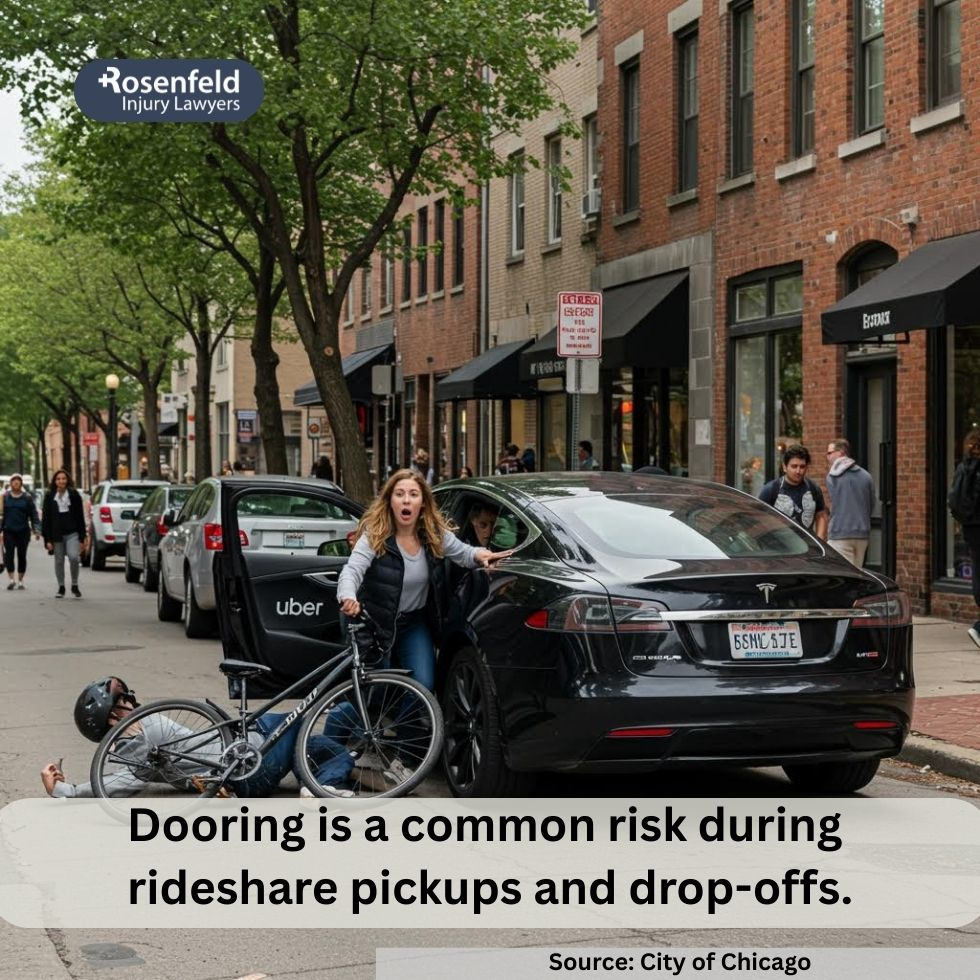
$1,680,000 – Motorcyclist Injured in Uptown Drop-Off Collision
A personal injury lawsuit was filed on behalf of Miguel, a 42-year-old motorcyclist hit by a car that was dropping off a passenger near Broadway and Lawrence. He suffered a mild traumatic brain injury. Our team built a strong case with video surveillance, medical experts, and digital rideshare logs to recover compensation for his recovery and rehabilitation.
$1,000,000 – Passenger Injured While Exiting Rideshare Vehicle
Sandra was stepping out of a rideshare car in Wicker Park when the driver suddenly accelerated, dragging her several feet. She suffered serious injuries to her hip and foot. We proved negligence on the part of the driver and secured a settlement.
$945,000 – Pedestrian Struck Outside O’Hare
While waiting to be picked up at O’Hare’s Terminal 2, Julian was hit by a rideshare driver pulling into the rideshare pickup lane. The impact left him with multiple broken ribs and a punctured lung.
$433,333 – Passenger Hurt While Getting Out of Rideshare Car
In Lakeview, our client Jessica exited her rideshare vehicle only for the driver to suddenly lurch forward. She sustained knee and shoulder injuries. We secured the settlement without having to go to trial
$350,000 – Cervical Disc Injury in Rear-End Collision
David was riding in the backseat of a rideshare car when the driver rear-ended another vehicle at high speed on the Kennedy Expressway. He suffered a herniated cervical disc. Though the rideshare company tried to argue the injury was pre-existing, our firm negotiated a pre-litigation settlement.
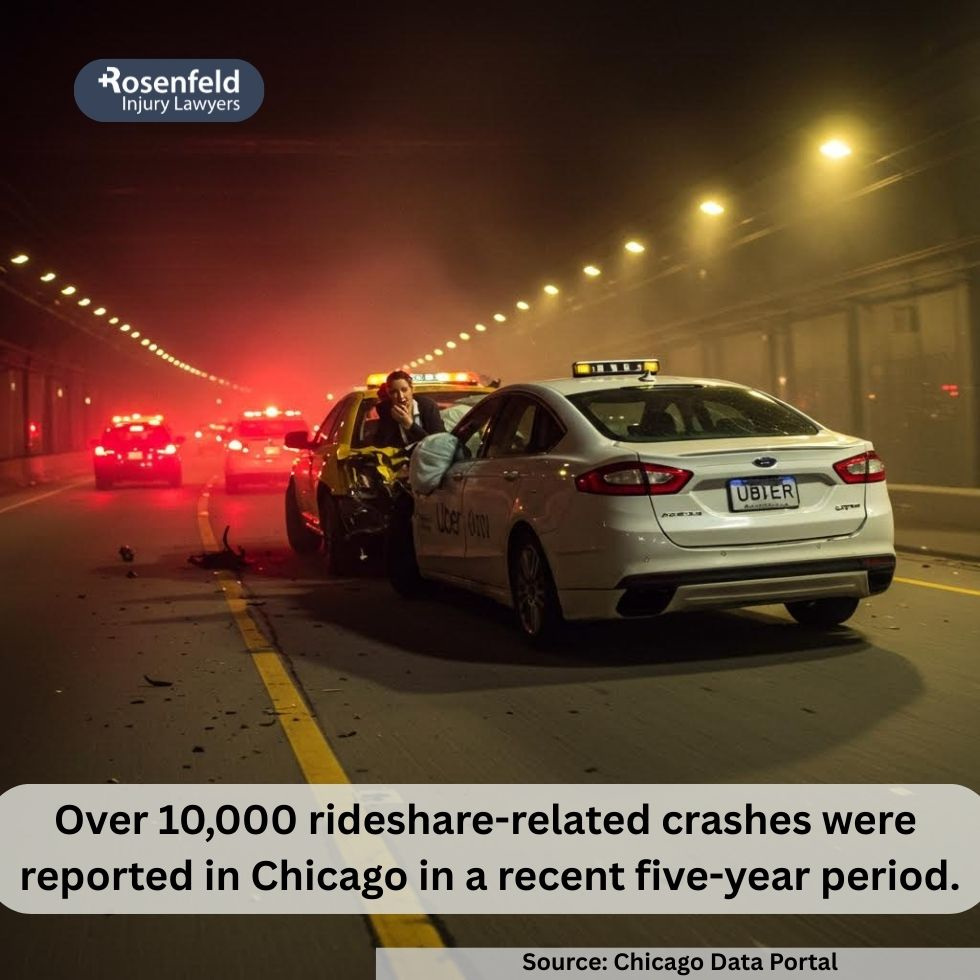
At Rosenfeld Injury Lawyers, we’re proud to be a top-rated car accident law firm in Chicago. Our team has recovered over $450 million in verdicts and settlements for clients hurt in Uber and Lyft accidents. We focus on results, compassion, and holding powerful companies accountable, no matter how complex the case.
We have received recognition from leading legal organizations and review platforms, including:
We’ve helped more than 5,000 clients move forward after serious accidents, including complex rideshare cases involving Uber or Lyft. When you hire our team, you’re getting experienced Chicago rideshare accident attorneys who are ready to fight for maximum compensation. We offer free consultation and work on a contingency fee basis, meaning you never pay anything unless we win your case.
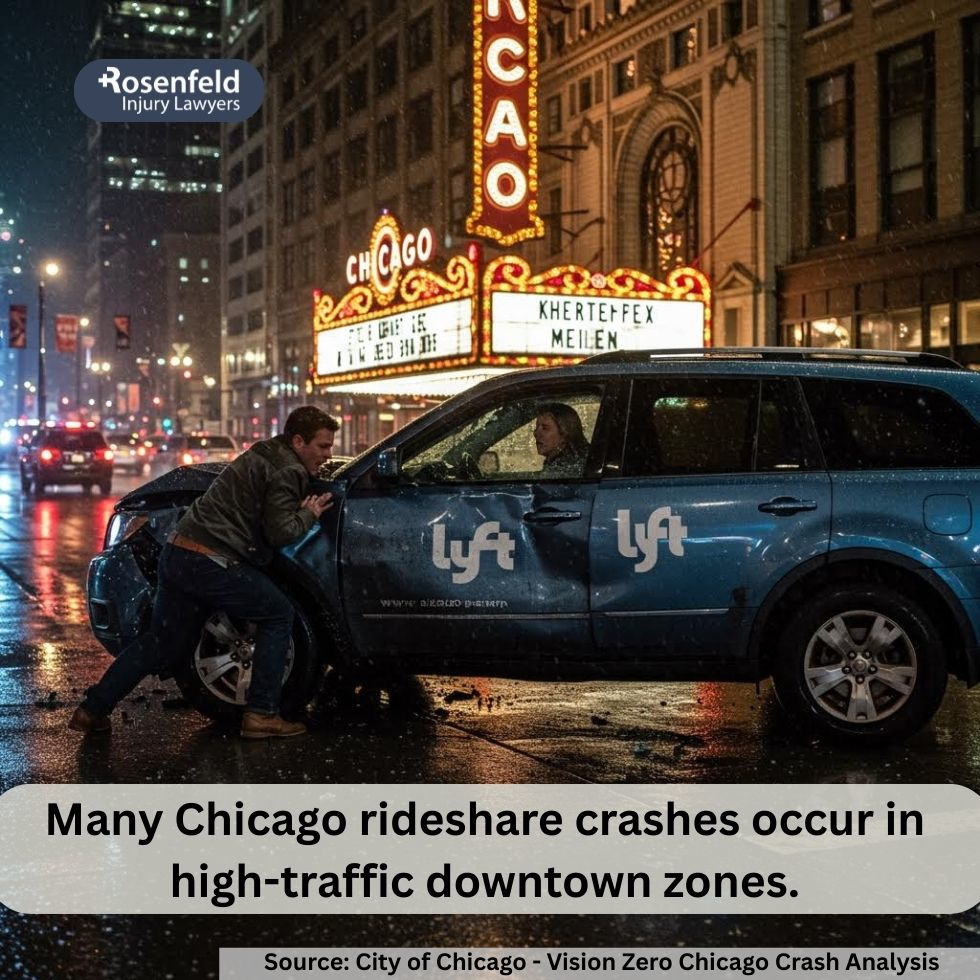
Our team of Chicago rideshare accident lawyers has handled nearly every type of case involving Via, Alto, Curb, Arro, Uber, and Lyft accidents across the city.
Many of our clients were simply trying to get home safely when their Uber or Lyft accident turned their lives upside down. Whether the accident occurs due to distracted driving, speeding, or failure to yield, passengers can suffer serious injuries, even though they weren’t behind the wheel.
Rideshare drivers often navigate unfamiliar neighborhoods or busy intersections while managing the app and directions. This distraction frequently leads to car accidents involving other drivers. We represent both rideshare drivers and third-party motorists injured in these collisions.
Chicago is a walking city, and unfortunately, rideshare drivers don’t always pay attention in crosswalks or at intersections. We’ve represented pedestrians hit while walking near Wrigleyville, the Loop, and even while waiting outside airport terminals like Midway or O’Hare.
With bike lanes running through many major streets, we’ve seen a sharp rise in automobile accidents involving rideshare drivers and cyclists or e-scooter users. Our firm understands how to approach these complex claims, especially when multiple parties share the road.
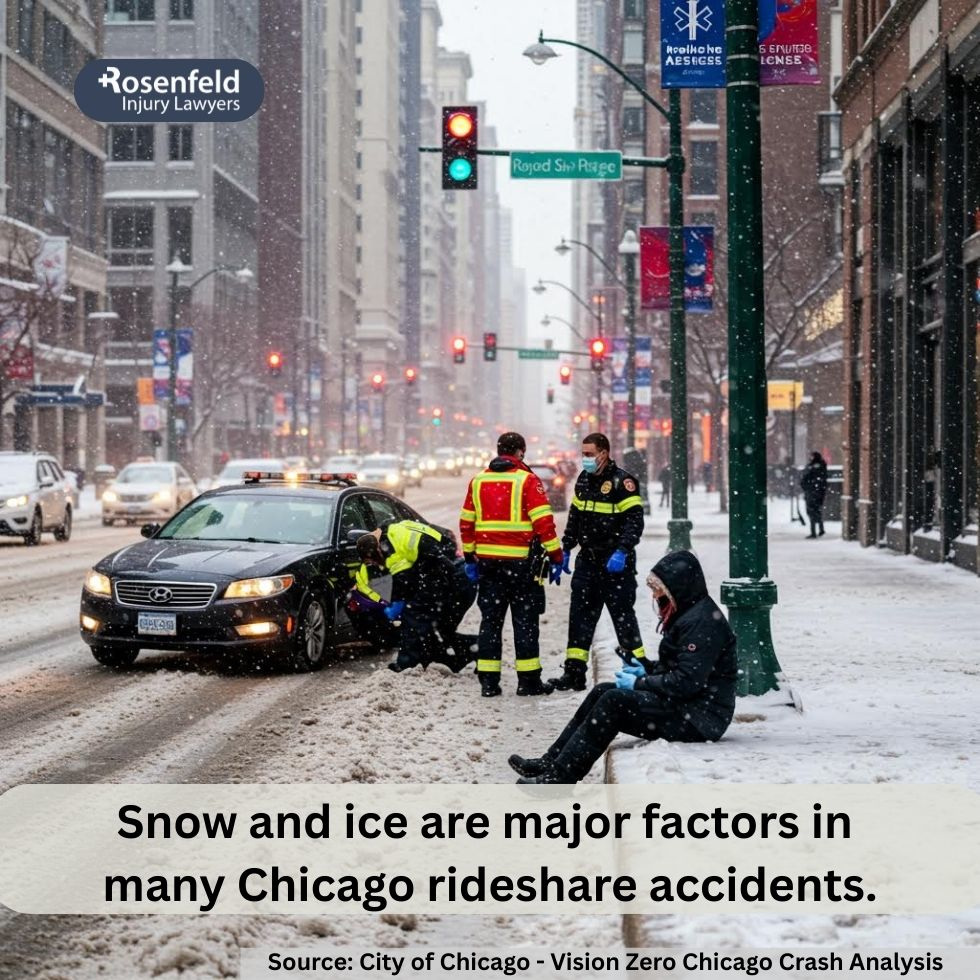
Some of the most severe injuries happen not during a trip, but while getting in or out of the car. We’ve handled multiple rideshare accident claims where drivers pulled away too soon or stopped in unsafe areas, putting passengers at risk.
Not all injuries are caused by collisions. We’ve taken on cases where passengers were harmed due to an assault or other criminal behavior by the driver. Rideshare companies often try to dodge responsibility, but we know how to challenge those defenses.
We’ve also been involved in high-speed, chain-reaction crashes on major roadways like I-90 and Lake Shore Drive where rideshare drivers were either at fault or caught in the middle. These cases often involve layered insurance coverage and complex liability questions, which we’re fully equipped to navigate.
Not every rideshare accident victim is a passenger or pedestrian. Drivers themselves are often seriously injured while working for Uber or Lyft. Some are struck by careless motorists, while others are hit during drop-offs, rear-ended in traffic, or sideswiped by distracted drivers.
When a rideshare driver is injured, the claims process can be especially complicated. Uber and Lyft typically classify drivers as independent contractors, which means they don’t qualify for traditional workers’ compensation. Instead, drivers often have to pursue claims against other at-fault drivers or rely on the limited insurance coverage provided by the rideshare company.
We’ve represented drivers who suffered broken bones, spinal injuries, and concussions while working behind the wheel. In every case, we focus on maximizing recovery through all available policies, whether that means the at-fault driver’s insurance, the rideshare company’s commercial coverage, or uninsured/underinsured motorist benefits.
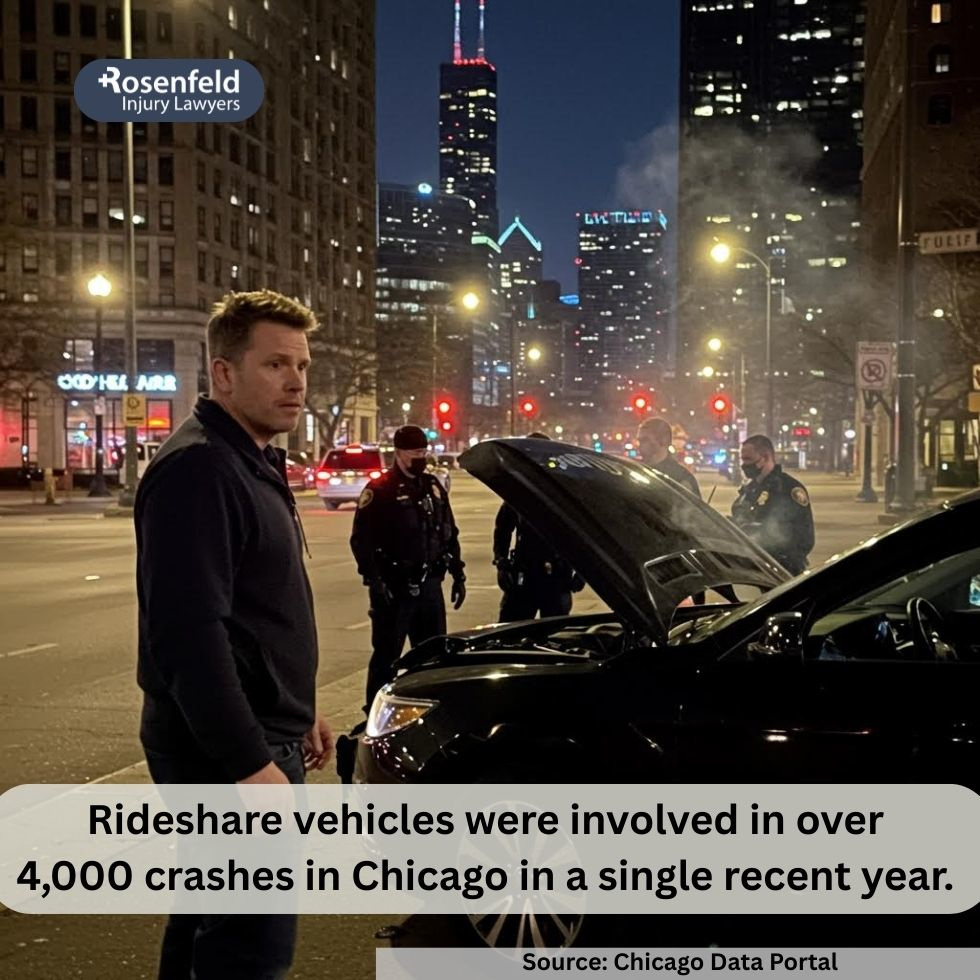
As Chicago rideshare accident lawyers, we’ve seen firsthand how often these crashes are caused by avoidable mistakes, such as:
Rideshare drivers rely heavily on their phones to manage pickups, track navigation, and respond to rider requests. All of that takes attention off the road. When a driver is looking at their app instead of traffic, accidents happen, often in split seconds.
We’ve handled many rideshare accidents that began with something as simple as an unsafe pick-up location. Stopping in bike lanes, double-parking, or letting passengers out in the middle of busy intersections can lead to crashes or pedestrian injuries.
Many rideshare drivers try to squeeze in as many rides as possible, especially during surge pricing. Speeding through neighborhoods or major roads like Lake Shore Drive or Western Avenue is a common cause of high-impact crashes involving passengers, other drivers, or pedestrians.
Most rideshare drivers work long shifts, sometimes after another job. Fatigue slows reaction time and leads to poor decision-making. Drowsy driving is a real issue in rideshare-related car accidents, especially late at night or during early-morning airport runs.
Unlike cab drivers, many Uber and Lyft drivers aren’t familiar with the neighborhoods they’re driving through. Relying too heavily on GPS can lead to missed turns, illegal U-turns, and sudden lane changes; all risky maneuvers in heavy city traffic.
Although Uber and Lyft claim to screen their drivers, we’ve handled rideshare accident insurance claims involving drivers with questionable driving histories or no commercial driving experience. When companies put the wrong people behind the wheel, passengers and others on the road pay the price.
Some rideshare accidents stem from basic traffic violations, like running red lights, failing to stop at crosswalks, or not yielding to oncoming traffic. These are especially dangerous in crowded downtown areas, school zones, and near CTA train stops.
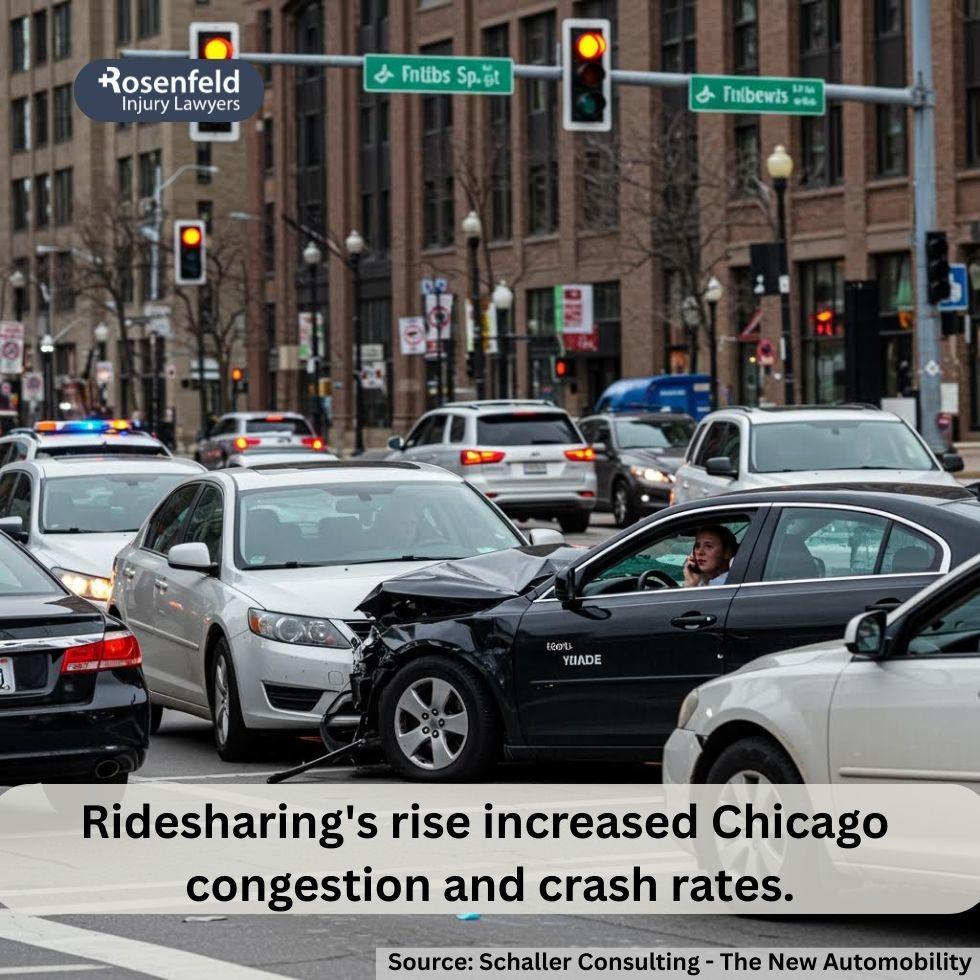
In our experience representing rideshare accident victims throughout Chicago, the injuries can vary depending on how the accident occurs, but they’re often serious and include the following:
Whether from hitting a window, doorframe, or pavement, head injuries are unfortunately common. TBIs can range from a mild concussion to permanent cognitive impairment, and the symptoms aren’t always immediate.
In high-speed car accidents, the sudden force can fracture vertebrae or compress spinal discs. These injuries may result in paralysis, nerve damage, or chronic pain. Spinal cord damage is especially common when a rideshare vehicle is rear-ended or T-boned at an intersection.
Fractures are some of the most common injuries in Uber or Lyft accidents. We’ve worked with clients who suffered broken legs while exiting the vehicle or broken arms during rollovers. These injuries often require surgery and extended time off work.
The impact of a rideshare accident can cause internal bleeding or damage to organs; injuries that may not show symptoms right away but can be life-threatening without immediate care.
Whiplash, herniated discs, and muscle strains are frequent injuries in rideshare collisions, especially rear-end impacts. These can affect a person’s mobility and ability to work, even when there’s no visible damage.
Broken glass, airbag deployment, or striking hard surfaces inside the vehicle often result in deep cuts or facial trauma. Some of our clients have needed reconstructive surgery or lived with permanent scarring after a rideshare crash.
Even in low-speed crashes, ligaments, tendons, and muscles can be seriously damaged. Soft tissue injuries might not appear on X-rays but can still cause long-term pain and limited range of motion.
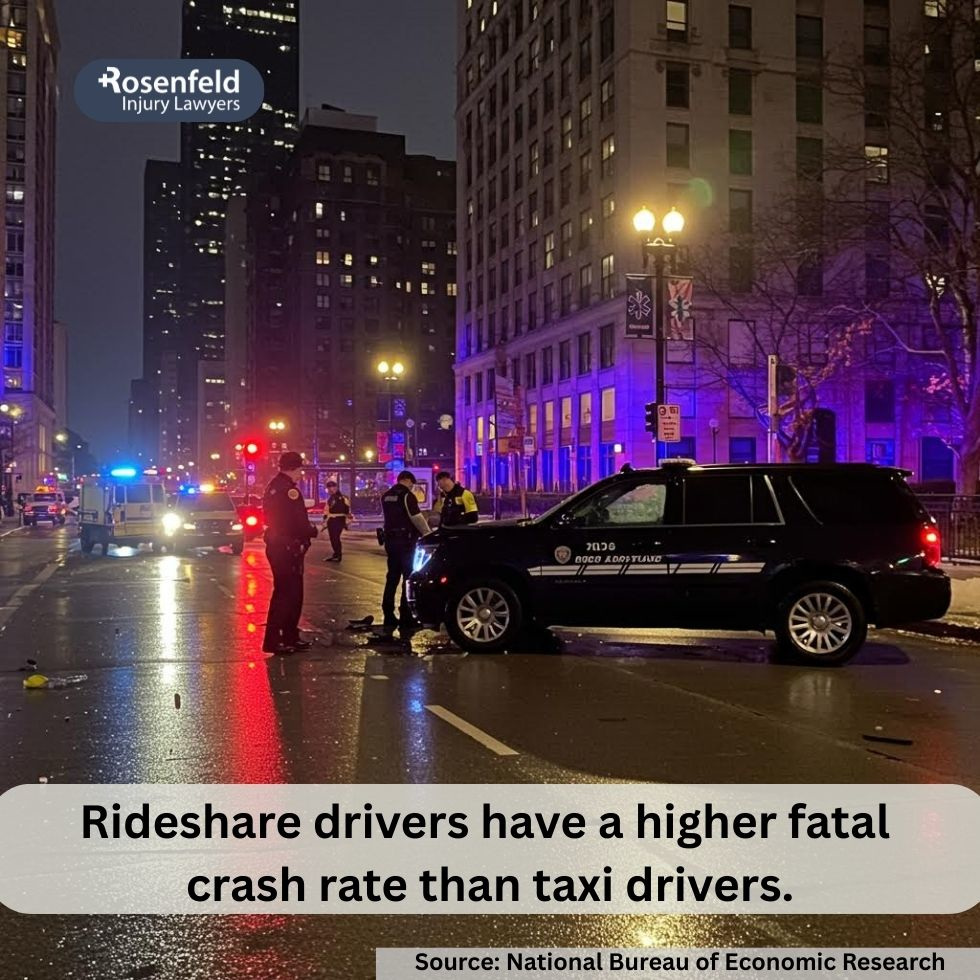
At Rosenfeld Injury Lawyers, we work to recover the full compensation our clients are entitled to under Illinois law.
These are the measurable financial losses tied directly to the accident, such as:
These reflect the personal and emotional impact of the accident—things that don’t come with a receipt but still matter:
If a family member was killed in a rideshare accident, Illinois law allows surviving relatives to pursue compensation for funeral expenses, loss of companionship, and loss of financial support.
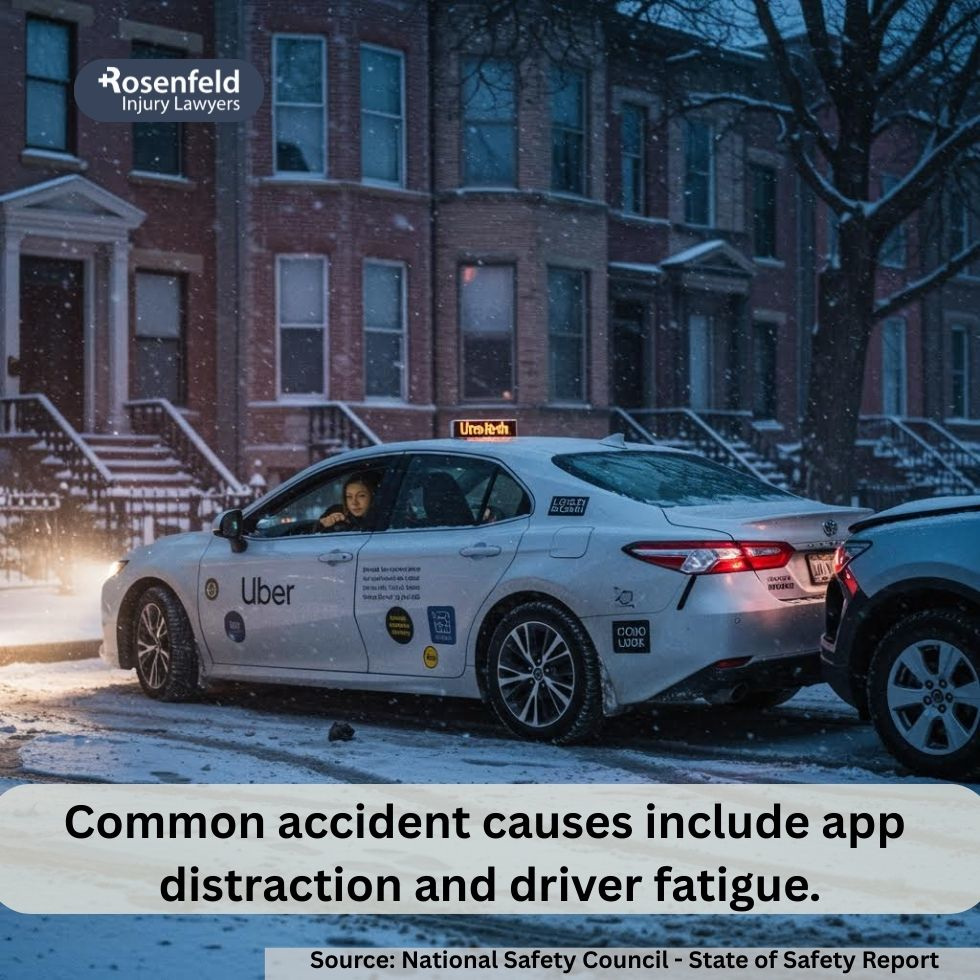
The value of a rideshare accident settlement in Chicago depends on many factors, including the severity of injuries, the cost of medical care, whether the victim can return to work, and which insurance policies apply.
The payouts for rideshare accidents vary dramatically, from multi-million-dollar jury awards to small policy-limit settlements. These examples help illustrate how courts and insurers across the country approach liability and damages.
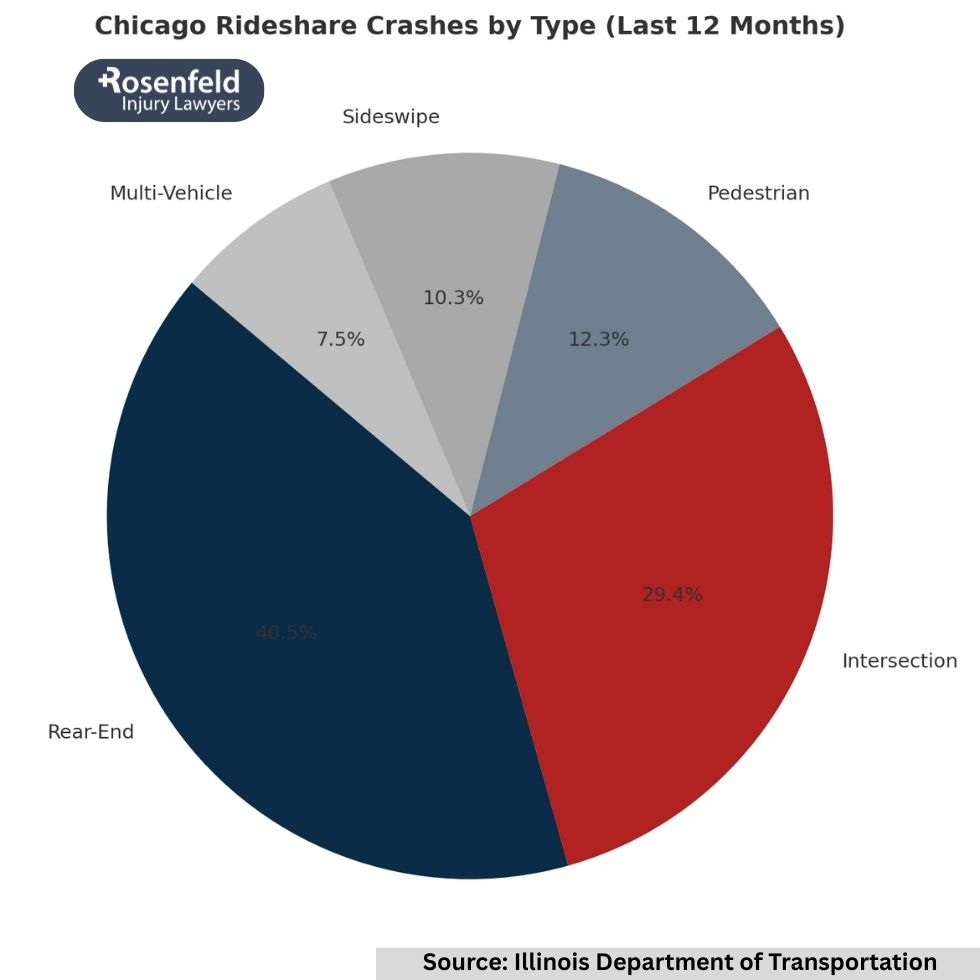
Rideshare accidents aren’t like typical car crashes. Here’s why having legal representation is so important:
Chicago’s traffic laws, court system, and insurance practices are unique, and so is the way rideshare companies operate here. We’ve handled cases in Cook County Circuit Court, against out-of-state corporate defendants, and with local adjusters who know our firm by name.
If you’re navigating a serious injury or wrongful death claim involving rideshare services, trying to go it alone puts your recovery at risk. Our team of experienced Chicago rideshare accident lawyers can level the playing field and make sure you’re protected every step of the way.
According to research from the University of Chicago Booth School of Business, the arrival of ride-hailing services in major U.S. cities is linked to a 3% increase in motor vehicle fatalities.
The study examined Uber and Lyft’s staggered rollouts across large U.S. cities from 2001 to 2016. In cities like Chicago, the increase in roadway deaths has remained persistent since rideshare adoption.
For context, roadway deaths nationwide were at a postwar low in 2010, about 32,885 annually. Just six years later, that number rose to more than 37,400. Researchers attribute roughly 987 additional deaths per year to the expansion of ride-hailing platforms.
Some parts of Chicago are more prone to rideshare accidents simply because of high traffic volume, pedestrian activity, and the way Uber and Lyft operate in these areas.
The rideshare pickup zones at O’Hare International Airport and Midway are frequent accident sites. Tight lanes, heavy congestion, and constant vehicle turnover create a high-risk environment for both passengers and pedestrians. We’ve represented clients injured while being dropped off, waiting at the curb, or navigating through the designated rideshare zones.
From Michigan Avenue to LaSalle Street, the Loop is one of the most dangerous areas for rideshare activity. Tourists, distracted drivers, cyclists, and nonstop foot traffic make this part of the city a perfect storm for serious collisions, especially during rush hour or major events.
Neighborhoods known for bars, clubs, and restaurants see a high volume of late-night rideshare traffic. In areas like River North, Old Town, and Wrigleyville, we’ve handled many cases involving intoxicated passengers, distracted drivers, and unsafe drop-off locations.
Accidents involving Uber and Lyft are also common on major roads like the Kennedy Expressway (I-90/94), Lake Shore Drive, and Western Avenue. Drivers often speed or weave through traffic to complete rides quickly, increasing the chance of high-impact collisions.
Areas near DePaul, UIC, and the University of Chicago, as well as busy transit hubs like Union Station and the Roosevelt CTA stop, also see frequent rideshare crashes. These locations have a mix of foot traffic, student pedestrians, and frequent stops, all of which raise the risk of an accident.
Rideshare accident claims in Chicago are governed by a mix of local ordinances, state laws, and legal precedents.
The llinois Ridesharing Arrangements Act (625 ILCS 30/) governs the legal relationship between rideshare drivers, passengers, and companies.
Rideshare drivers (even if using their personal vehicle) are not shielded from liability for negligence. In other words, a driver can still be held responsible for injuries they cause, even if they were offering a ride voluntarily or through a platform.
The law also reinforces that insurance coverage must extend to passengers, which gives us a legal basis to pursue damages even when the rideshare driver’s personal insurer tries to deny coverage.
Chicago’s Transportation Network Providers Ordinance (Chapter 9-115) outlines the rules Uber, Lyft, and other rideshare companies must follow to operate in the city. It covers:
Violating any of these city rules can support a claim of negligence.
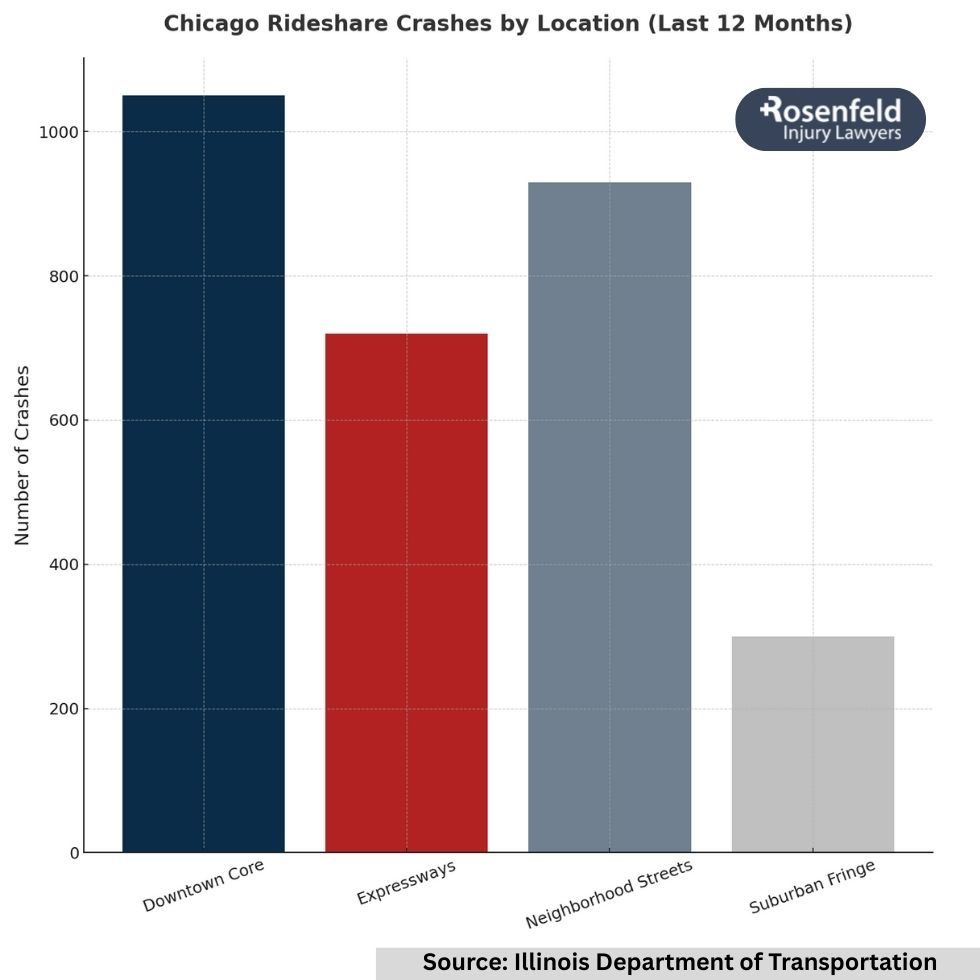
The Illinois Vehicle Code (625 ILCS 5/) is crucial in proving fault in any motor vehicle accident, including those involving rideshare drivers. The code establishes rules of the road that, when violated, often serve as clear evidence of negligence.
Some frequently cited sections in rideshare cases include:
Violating any of these laws can establish a prima facie case of negligence, giving us leverage during negotiations or trial.
In Doe v. Lyft, Inc., an Illinois appellate court examined whether Lyft could be held liable for the actions of its driver, despite labeling them as an independent contractor. The court evaluated Lyft’s level of control over the driver’s conduct; a central issue in many rideshare accident lawsuits.
Under 735 ILCS 5/13-202, victims generally have two years from the date of the accident to file a personal injury claim, including those involving rideshare vehicles like Uber or Lyft.
If your rideshare accident resulted in a wrongful death, the statute of limitations under 740 ILCS 180/ is still two years starting from the date of death, not necessarily the date of the accident.
There are some exceptions that may shorten or extend this deadline:
We always recommend speaking with a rideshare accident lawyer as early as possible. Waiting too long can lead to critical evidence being lost, or your claim being barred entirely.
Liability in a rideshare automobile accident isn’t always straightforward. Unlike traditional car accidents, these cases can involve multiple potentially responsible parties, overlapping insurance policies, and legal debates over employment status.
Determining liability takes investigation, access to app data, and a clear understanding of how state and local laws apply. Our legal team has the tools and experience to uncover every responsible party and pursue full compensation.
Here are the most common parties who may be liable in a rideshare accident:
If the crash was caused by careless or reckless driving, the rideshare driver is usually the first party we investigate. Whether they were distracted, speeding, or failed to yield, their negligence can make them personally liable for your injuries.
In some cases, Uber of Lyft themselves may share responsibility, especially if they failed to properly vet the driver, ignored red flags in the driver’s record, or violated safety regulations. While Uber and Lyft often try to avoid liability by classifying drivers as independent contractors, courts have increasingly examined how much control these companies exercise over drivers.
Many rideshare accidents involve more than one vehicle. If a third-party driver caused or contributed to the crash, we’ll pursue claims against their insurance as well. Shared liability is common in Chicago’s dense traffic, especially at busy intersections or during lane changes.
If the accident was caused by a mechanical failure—such as brake failure or a steering defect—we may look into a product liability claim or negligent maintenance. This is more likely in high-speed collisions or single-vehicle crashes.
If unsafe road conditions, missing signage, or poor roadway design played a role, a government agency may be liable. Claims against city or state entities have shorter deadlines and specific procedures, so early legal action is crucial.
If the at-fault driver was working for another company at the time of the crash—such as delivering food or transporting employees—we may be able to hold that business accountable under vicarious liability.
When you’re injured in a rideshare accident in Illinois, who pays for your medical bills and other damages depends heavily on what the Uber or Lyft driver was doing at the time of the crash.
Illinois law, along with local ordinances in Chicago, requires these companies to provide liability coverage, but the amount varies depending on the driver’s status in the app. This structure creates three distinct coverage periods, each with different limits.
If the rideshare driver is not logged into the app, Uber and Lyft are not involved. Any accident involving the driver during this time is treated like a standard personal vehicle crash. Only the driver’s personal auto insurance applies.
Once Lyft or Uber drivers log into the app but haven’t yet accepted a ride, limited coverage from the rideshare company becomes available. Illinois requires rideshare companies to provide:
This coverage is considered contingent and only applies if the driver’s personal insurance company refuses liability or they don’t have enough insurance coverage.
As soon as the driver accepts a trip, and until the ride ends, full commercial coverage applies. This is when Uber and Lyft provide the most protection:
This insurance typically covers both passengers and third parties—such as other drivers, pedestrians, or cyclists—who are injured in a rideshare accident.
Rideshare companies like Uber and Lyft—and their insurance carriers—routinely look for ways to minimize or avoid paying out on accident claims. Even in cases where fault seems obvious, they may raise legal defenses designed to delay, reduce, or deny your compensation.
At Rosenfeld Injury Lawyers, we know what to expect and how to push back. Here are some of the most common defenses used in rideshare car accident cases, and how we counter them.
This is one of the most common arguments. Uber and Lyft try to avoid liability by claiming their drivers are independent contractors, not employees.
While that can limit certain types of direct corporate liability, we often show that these companies still maintain significant control over their drivers’ conduct, routes, and safety standards. In some cases, they can still be held responsible for negligent hiring, supervision, or failure to remove unsafe drivers.
Rideshare companies only provide coverage when the driver is logged into the app. If an accident happens while the app is off, they claim it’s outside their coverage period. We investigate phone records, ride history, and app usage logs to confirm whether the driver was active, even if they claim otherwise.
Illinois uses a modified comparative negligence rule. If you’re found more than 50% at fault, you can’t recover damages.
Rideshare insurers may argue that you, as a pedestrian, passenger, or another driver, were distracted, impaired, or acting recklessly. We challenge these claims with surveillance footage, eyewitness testimony, and expert analysis to protect your right to compensation.
Insurers love to argue that your pain is from an old injury or pre-existing condition, not the accident. We work with your doctors to document how the rideshare car accident either caused new injuries or aggravated prior ones. Medical records, imaging results, and expert testimony often make the difference.
Sometimes, insurers claim that policy limits don’t apply or are already exhausted. In rideshare cases, this is often an attempt to misclassify the coverage period (such as arguing the driver hadn’t yet accepted the ride).
We dig into ride logs, timestamps, and trip data to prove the correct coverage tier applies, and push for full use of the $1 million policy when it’s warranted.
If you’ve been injured in a rideshare accident—whether as a passenger, pedestrian, or another driver—there are steps you can take right away that can significantly improve your chances of recovering full compensation.
Rideshare car accident cases can be complicated, but what you do in the hours and days after the crash matters just as much as what happens in the courtroom. Here’s how to protect your claim from the start.
Even if your injuries seem minor, get checked out right away. Not only is this critical for your health, but it creates a clear medical record that links your injuries to the accident. Delays in treatment are often used by insurance companies to argue that you weren’t really hurt.
Always report the crash to law enforcement, even if the driver tries to talk you out of it. A police report documents the scene, records witness information, and gives us a reliable foundation to work from.
If you’re able, document the accident scene, vehicle damage, road conditions, and your injuries. Also photograph the rideshare driver’s ID within the app and any visible company decals. These images can become key pieces of evidence if liability is disputed later.
Independent witnesses can make or break a case. Their testimony carries weight, especially if the rideshare driver or company tries to shift blame. If someone saw the crash happen, get their name and number before they leave.
If you were a passenger, take screenshots of your ride details, payment confirmation, and driver profile. This helps us establish when the driver was active in the app, which affects how much insurance coverage is available.
Anything you post about the accident or your injuries could be used against you. Insurance companies and defense attorneys often monitor social media to find anything they can use to question the seriousness of your injuries or your version of events.
Waiting too long to hire an attorney can cost you access to vital evidence—especially rideshare app data, vehicle information, and phone records. Our firm knows how to send immediate preservation letters and start building your case while the evidence is still fresh.
After a rideshare accident, you’re likely facing medical bills, insurance calls, and a lot of uncertainty about what to do next. While Uber and Lyft promote convenience and safety, their companies—and their insurers—are anything but cooperative when it comes to paying fair compensation.
That’s where we come in. At Rosenfeld Injury Lawyers, we help rideshare accident victims in Chicago get real answers, fair compensation, and experienced representation through every stage of the case.
From start to finish, we’re here to protect your interests, level the playing field, and make sure you’re not left dealing with the aftermath of a rideshare accident alone. Here’s what we will do.
We move quickly to secure police reports, ride logs, app data, black box information (if available), and surveillance footage. Our team also interviews witnesses, works with accident reconstruction experts, and obtains driver background records to build a solid case for liability.
Rideshare accidents often involve more than one insurance company, personal, commercial, and corporate. We determine which policies apply and make sure none of them avoid responsibility through coverage loopholes or delay tactics.
We work with your doctors to fully document your injuries and the long-term effects they may have on your life, health, and career. Whether your case involves physical pain, lost wages, emotional trauma, or permanent disability, we fight for every dollar you’re owed.
We take over the phone calls, paperwork, and negotiations so you can focus on recovery, not on chasing down adjusters. If the insurance company refuses to offer a fair settlement, we’re fully prepared to take your case to trial.
We handle rideshare accident cases on a contingency fee basis. That means you pay nothing upfront, and no attorney’s fees at all unless we recover compensation for you.
Ridesharing is not considered public transportation in Illinois. Public transit systems like the CTA are regulated as common carriers, which owe passengers the highest duty of care. Rideshare services, on the other hand, are treated more like private motorists under the Illinois Vehicle Code and the Ridesharing Arrangements Act. This distinction affects how liability is determined and which insurance policies apply.
No. Supplemental insurance may apply to passengers, pedestrians, cyclists, and even other drivers injured in a rideshare car accident. Coverage depends on whether drivers were logged into the rideshare apps and whether a ride was in progress. Uber and Lyft are required to carry $1 million in liability coverage once a ride is accepted, which can extend beyond passengers to other accident victims.
To prove liability in a rideshare accident, we have to show four things:
Illinois follows a modified comparative negligence system. If you were 50% or less at fault, you can still recover damages, but your compensation will be reduced by your share of fault. If you’re found more than 50 percent responsible, you won’t be able to recover. This makes it critical to have a rideshare accident attorney pushing back against exaggerated claims of shared fault.
Not without speaking to a rideshare accident lawyer first. Initial settlement offers are usually far below the true value of your case. Insurance companies often make quick offers hoping you’ll accept before the full extent of your injuries and future costs are clear. Our team reviews offers, calculates your total damages, and negotiates for the maximum possible recovery.
At Rosenfeld Injury Lawyers, there are no upfront costs. Our rideshare accident attorneys work on a contingency fee basis, meaning you only pay if we win your case. Our fee is a percentage of the settlement or verdict we obtain for you. If we don’t recover compensation, you don’t owe us anything.

If you’ve been injured in a rideshare accident in Chicago, you don’t have to take on Uber, Lyft, or their insurers by yourself. At Rosenfeld Injury Lawyers, we’ve helped thousands of clients recover compensation after serious accidents, and we know how to fight for the full value of your case.
Your consultation is always free, and you never pay out of pocket. We work on a contingency fee basis, which means we only get paid if we win for you.
Call us today at (888) 424-5757 to speak directly with an experienced Chicago personal injury lawyer about your case. We’re available 24/7 to answer your questions and start building the strongest claim possible.
All content undergoes thorough legal review by experienced attorneys, including Jonathan Rosenfeld. With 25 years of experience in personal injury law and over 100 years of combined legal expertise within our team, we ensure that every article is legally accurate, compliant, and reflects current legal standards.